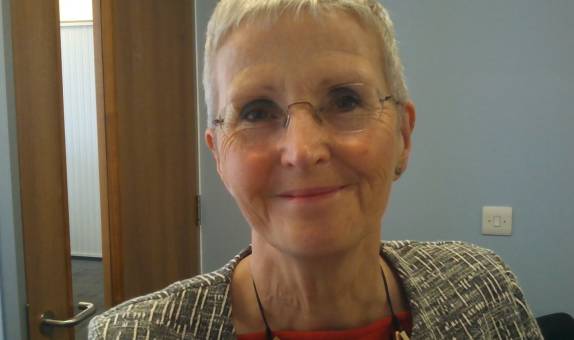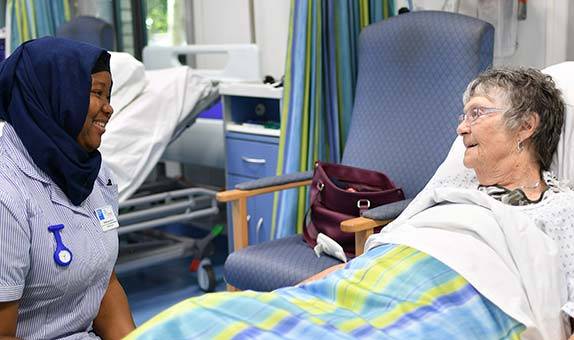Clinical Leadership MSc
Why choose this course?
This course is ideal for qualified healthcare professionals based in the UK who wish to learn more about leadership and management. You will be able to apply your learning to a clinical setting and to research healthcare issues within the workplace. You will be kept up to date with recent developments, legal requirements and ethical practice, sharing experiences with professionals from a variety of fields.
This innovative course is designed for qualified healthcare professionals, who are keen to learn more about leadership strategies and management techniques. It consists of taught modules, a work-based learning project and enables you to explore a leadership topic of interest in depth, with the aim to publish. You will learn how to lead and manage healthcare practice and implement research advances to enrich evidence-based practice. The course will help you to drive service improvement projects relevant to your practice, and research healthcare issues within your workplace. The course combines academic teaching with interactive learning and incorporates theories of leadership and change management. You will gain confidence to influence decision makers with your recommendations.
The structure of the course allows you to continue working while studying. The full-time option has one classroom based day per week (Wednesdays) and the part-time option is once per fortnight (Wednesdays). Many of our students have been promoted as a direct result of studying this course.
Each course module is worth 30 Level 7 credits. For the PgCert, you will need to complete two modules; for the PgDip, you will need four, and for the MSc, you will need four, plus a final research project worth 60 credits.
| Mode | Duration | Attendance | Start date |
|---|---|---|---|
| Full time | 1 year | Most Wednesdays | January 2025 |
| Part time | 2–3 years | Alternate Wednesdays | January 2025 |
The modules within this course can also be taken on an individual basis (postgraduate short course).
| Main Location | Kingston Hill |
Reasons to choose Kingston University
- Our part-time route, with one study day per fortnight, is designed for working healthcare professionals.
- You will develop your skills in leadership, decision-making, networking and reflective practice.
- You will study alongside senior healthcare professionals and share good practice.
What you will study
The course consists of four taught modules and a final Capstone project which enables you to explore a leadership topic in depth. You will learn how to lead and manage innovations in healthcare practice and implement research advances to enrich evidence-based practice. Part-time students will take the following modules in each year (full time students will undertake all modules in one year).
Modules
Core modules
Healthcare Management and Evaluation
30 credits
Examine the theoretical, social, political and economic factors influencing the management, planning, delivery and evaluation of health and care in the UK. International perspectives and models of health and care will be included. Students will be exposed to the most recent health policies and initiatives which influence quality service provision reflecting the key principles of the UK health and care systems.
Leadership and Change Management
30 credits
Take a client-centred and service-based approach to improvements in the patient/client experience. A number of leadership theories/approaches are explored and evaluated. A blend of learning approaches is employed to promote and enhance your learning experience. You will be encouraged to network with key influencers and opinion leaders within the organisation to help them gain practical insights into leadership and change.
Reflexive Leadership
30 credits
This module provides you with the opportunity to place a critical lens on the production of leadership identities, going beyond the individualistic leader to enable insights into the relational processes through which leadership is performed. You will be invited to focus reflexively on the details of your interactions at work, applying a psychosocial approach to consider the subjective, the personal, and the interpersonal aspects of organisational behaviour. The module explores ideas and beliefs, about how people talk about leadership and the stories and narratives that they construct.
Research Methods and Data Analysis
30 credits
Foster an in-depth understanding of the processes, stages and management of research. This module enables you to demonstrate critical appraisal and develop research skills applicable to both quantitative and qualitative approaches.
This module introduces the theories of research and provides flexible opportunities for you to apply your newly developed knowledge. It allows you to practically follow the early stages of research by formulating a research proposal; and the late stages of research by analysing, interpreting, presenting and discussing a data set provided by the module leader(s). Emphasis will be placed on ethical principles, which students will discuss and apply in their research proposal and data analysis.
Final Capstone Project
60 credits
This module is required for students undertaking studies at master's level and is normally taken after achieving postgraduate diploma level. The module will provide you with the experience of utilising principles of research and academic writing and thus demonstrate the intellectual skills learnt on the course. You are expected to review critically research and to evaluate the evidence underpinning your own practice. The module will provide you with the opportunity to implement the knowledge and skills developed during the previous modules by conducting research focused on a topic of your choice related to your area of practice with the support of a research supervisor. The module will enhance your presentation and publication skills as the assessment will include writing an abstract, presenting a poster and writing an article suitable for publication in a peer-reviewed journal.
Entry requirements
Teaching and assessment
Students learn by sharing experiences, using an action learning approach combining creative teaching and learning techniques, such as use of video, role play and peer assessment. Due to the interprofessional nature of this course, you will have opportunities to discuss the wide range of challenges of leadership in the healthcare profession. You will gain practical skills, such as advanced decision making, creative problem solving and critical thinking.
Who teaches this course?
Fees for this course
Additional costs
Depending on the programme of study, there may be extra costs that are not covered by tuition fees which students will need to consider when planning their studies. Tuition fees cover the cost of your teaching, assessment and operating University facilities such as the library, access to shared IT equipment and other support services. Accommodation and living costs are not included in our fees.
Where a course has additional expenses, we make every effort to highlight them. These may include optional field trips, materials (e.g. art, design, engineering), security checks such as DBS, uniforms, specialist clothing or professional memberships.
Facilities
As a student at Kingston University there are a range of facilities available that will help you during your course, including:
- clinical teaching facilities;
- computing facilities, including a range of software applications, plus free email and internet access; and
- a dedicated Graduate Centres on each Kingston University campus, providing seminar rooms, computing facilities and social spaces.
- the libraries at each of the Kingston University campuses - offering online database subscriptions, resource materials, PC clusters and a wireless network for laptop use, as well as subject libraries.
After you graduate
The course will enable you to manage service improvement projects relevant to your workplace. Many of our students have been promoted as a direct result of studying this course.
What our students say
Links with industry
Many teaching staff are research active, which keeps your learning cutting-edge, and others are expert practitioners. This combination of academics and practitioners provides a uniquely dynamic environment. Read more in our Research Areas.
As well as developing your understanding of your specialist area, this course will make sure you:
- keep up to date with recent developments, legal requirements and ethically-sound practice
- reflect critically on your practice
- develop your judgement and decision-making skills
- improve your networking skills
- gain skills in managing others.
You will also have the chance to meet other professionals in the same situation as yourself.
Research areas
Many of our staff are research active, often in partnership with NHS trusts. This ensures they are in touch with the latest thinking and bring best practice to your studies.
Research themes and programmes include:
- Children and families
- Midwifery
- Emergency and critical care
- Healthcare education
- Integrative and collaborative working
- Health and social care for people with long term conditions and their family carers - research that informs policy and practice to support people with long term conditions
- Innovation and development in the healthcare workforces and organisation - addressing a broad range of workforce questions, including how best to educate and train people for their current and future work in health and social care.
Find out about research in the Faculty.
Course changes and regulations
The information on this page reflects the currently intended course structure and module details. To improve your student experience and the quality of your degree, we may review and change the material information of this course. Course changes explained.
Programme Specifications for the course are published ahead of each academic year.
Regulations governing this course can be found on our website.













